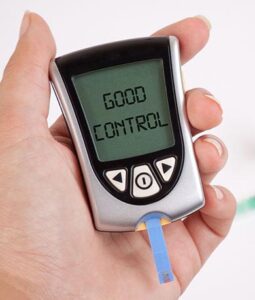This article isn’t touching on technology so much as basic language. The way in which people talk about our diabetes can cause a lot of unnecessary friction.
“Control”?
Often we hear references to our “diabetes control”.
“[your] diabetes is well-controlled.”
“[…] poorly controlled”.
“[…] uncontrolled”.“How has your diabetes control been?”
 Usually this language comes from people who have no actual experience in living with diabetes. It’s also seen in cheap articles like this one that talks about “Easy ways to lower your blood sugar”. Unfortunately this is terrible language to use, for multiple reasons.
Usually this language comes from people who have no actual experience in living with diabetes. It’s also seen in cheap articles like this one that talks about “Easy ways to lower your blood sugar”. Unfortunately this is terrible language to use, for multiple reasons.
I think it’s important to realise two fundamental factors:
- If my diabetes was “well-controlled” last time but not this time, that can feel like it’s putting a lot of blame on me.
It becomes all about my control of the diabetes. - To many of us the concept of being able to “control” diabetes seems a pipe dream or fantasy.
 It’s important to recognise that there are many factors affecting the state of our diabetes (at least 42 affecting BG, allegedly). And not all of those are things that we can directly control!
It’s important to recognise that there are many factors affecting the state of our diabetes (at least 42 affecting BG, allegedly). And not all of those are things that we can directly control!
It’s counter-productive for everyone, if a doctor’s question ends up just getting people angry when in fact they were only trying to help.
To anyone who feels that this is being very abstract and overly-sensitive, I’m afraid you’ll just have to butt out. You can’t tell people how they feel, and the above thoughts do occur to many people.
And everyone deserves respect.
“Manage”?
Some people have tried to replace “control” with “manage” and “management”, but by itself that doesn’t really solve the problem.
“How has your diabetes management been?”
Is it “well managed”? “Poorly managed”? This still places all the responsibility (blame) on us.
A different paradigm
I recently came across a concept (thanks to a random conversation amongst PWDs on Twitter) that I think applies very well.
Q: “How has your diabetes been going?”
A: “Feral. I keep working on it, but my diabetes is still feral.”
This invites all sorts of analogies. For example with pets or even with human children:
“Yesterday they were very well-behaved.
But today I’ve been reminded they’re still feral beasts inside.”
“Feral”? Why not “wild”?
Feral has a few meanings in the dictionary.
- Sometimes it’s used to refer to something that was domesticated but has been living in the wild. Strictly speaking our pancreases/etc were once “domesticated” I suppose.
- But it’s also used to imply something with a more random and ferocious temperament than something that’s just “wild”. I think that fits too.
Now I’m not an expert animal trainer, but hopefully this analogy won’t offend anyone who is and sees this:
 A wolf can be captured and maybe even “tamed”, but not “domesticated”. It will always have those wild instincts ready to come forth at any point.
A wolf can be captured and maybe even “tamed”, but not “domesticated”. It will always have those wild instincts ready to come forth at any point.
You can work with such an animal and give it all sorts of training and encouragement, and it’s even possible to get it to behave the way you expect.
Most (or at least some) of the time. At any point the “training” can be forgotten, and it requires constant vigilance.
Even “domesticated” pets can sometimes have instincts come out which may seem “feral” to some observers.
I quite like the image of a wild creature making its own mind up about whether it’s going to “play by the rules” or not.

Seems very much like diabetes!
It can even work with those problem words
“I’m having trouble getting any sort of control over the feral beast.”
“I’ve been managing the feral beast some of the time, but it keeps getting away from me.”
“I feel like I’ve been managing the beast most of the time, but it still occasionally turns on me.”
The recognition (on both sides of the conversation) that the thing we’re hoping to control has instincts and almost a mind of its own is very useful.
Maybe this concept will come in handy next time your doctor asks questions and raises your hackles.

Really enjoyed reading this, as my diabetes has been ‘feral’ for the last couple of days; it has cheered me up, excellent points
Speaking with my Endo today your remarks were very timely and relatable. I only wish I had read it before the appointment rather than after! 🙂
As always some very valid and helpfully thought provoking points David. Diabetes certainly seems to act like a feral beast when you least want it to. Pushing for ‘the wild side’ just at those times when we wish it would stay nice and docile!
Well said, David – thanks!
If someone asks me, “How’s your diabetes control?”, I always want to say, “Do you mean right now? Or last night? Or yesterday? Or last week? You do know, don’t you, that it’s different every day? I can’t possibly answer that question in any meaningful way.”
I like your “feral” metaphor.
A thought provoking article.
Brilliant article, David – thank you. I woke up at 2 am this morning with a stabbing pain in my toe, so painful it woke me up, and lay there for hours googling articles on diabetic peripheral neuropathy and its causes and treatments, and I felt SO FURIOUS every time I read that “uncontrolled diabetes” was the cause. I’ve had Type 1 for 45 years and my control has been excellent – TIR 98 per cent these days as I’m looping, and an A1C that’s always been less than 7 and is now less than 6 – so the only thing I’ve done wrong has been to stay alive this long and experience the consequences of 45 years of diabetes. It infuriates me to hear the casual way I’m being blamed for the complications of my condition.
Yes “uncontrolled” does project a lot of blame.
But also anyone who writes that “uncontrolled diabetes is the cause” is probably wrong. Usually it’s much more precise to say something like (if they insist on using that descriptor) “uncontrolled diabetes [does/seems to/etc] increase the risk”. Life is not absolutes, and people without diabetes sometimes get these things too.
Do keep in mind that “It’s not always diabetes“.